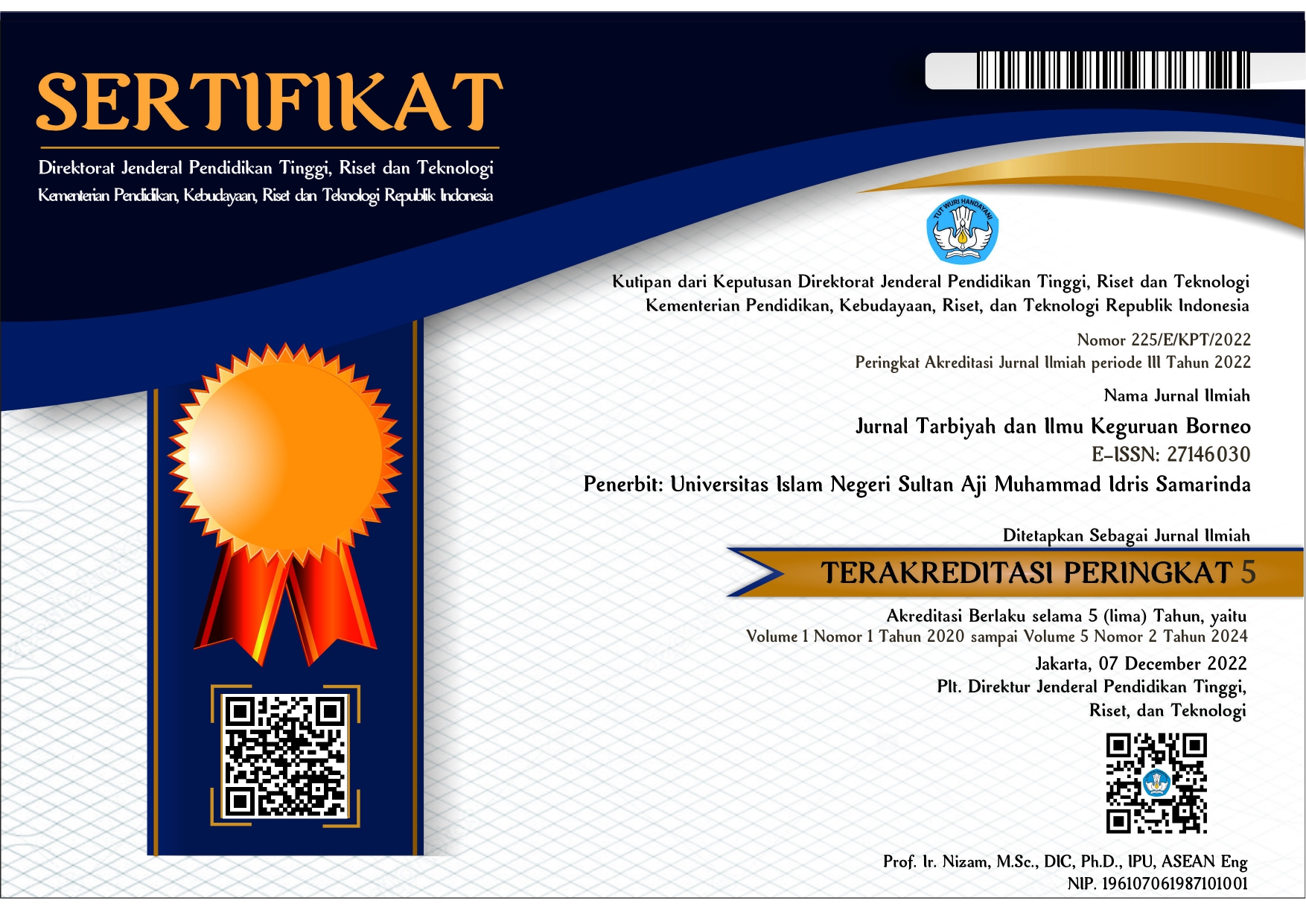Kemampuan Guru dalam Menstimulasi Minat Belajar Siswa Kelas VIII-3 Madrasah Tsanawiyah Negeri 1 Balikpapan Mata Pelajaran IPS Melalui Model Problem Based Learning
Abstract
Based on surveys and the first observations of writer at the Madrasah Tsanawiyah Negeri 1 Balikpapan, enthusiastic students in participating in learning materials can take various forms depending on each teacher who presents with the learning design they display. One way is to use the learning model. According to the opinion of the author most learning materials that use learning models are usually followed by students with enthusiasm and positive responses, so that in the learning process there is an active interaction and communication between teacher and students. Data collection techniques in this study are: observation, documentation and tests. Furthermore, the data were analyzed using descriptive qualitative analysis methods, namely describing the data obtained through research instruments. Based on the results of the author's explanation in the previous chapter, the following conclusions can be drawn: The results obtained from cycle I to cycle II have increased the average value of 73.38 to 80.58. Meanwhile, when compared to the time before the action, the average initial condition value was 63.82 to 73.38. The actions taken in the first cycle and second cycle prove that 63.82 to 73.38 can stimulate the interest in learning social studies students of class VIII-2 MTs Balikpapan. So it can be concluded that, the implementation and application of learning by using the problem based lerarning (PBL) model can stimulate student interest in learning so as to improve social studies learning outcomes. Based on the final results studied, the percentage increase at the end of the cycle amounted to 91.17%, which means that this figure is greater than the standard indicator that is 75% (91.17%> 75%). So it can be concluded that the hypothesis "Problem Based Learning Model Learning can stimulate students' interest in learning for Class VIII-2 in Social Studies in MTs Negeri 1 Balikpapan", was accepted.
References
Arikunto, Suharsimi, “Penelitian Tindakan Kelas. Cet. IV. Jakarta: PT. Bumi Aksara, 2007.
Arikunto, Suharsimi, dkk, Penelitian Tindakan Kelas, Cet. VI, Jakarta: Bumi Aksara, 2008.
Baharudin, Mazlina, and Azlina Md Sadik. “A View Into Successful Teaching Techniques: Teaching Malay Language As A Foreign Language In Malaysia.” DINAMIKA ILMU 16, no. 2 (December 12, 2016): 201. https://doi.org/10.21093/di.v16i2.355.
Fauzan, Umar. “The Use of Improvisations Technique to Improve the Speaking Ability of EFL Students.” DINAMIKA ILMU 14, no. 2 (December 1, 2014): 264. https://doi.org/10.21093/di.v14i2.17.
Iftanti, Erna. “Investigating Inspiring English Lecturers in a Faith-Based Educational Institution: EFL Learners’ Perception.” DINAMIKA ILMU 15, no. 2 (December 1, 2015): 343. https://doi.org/10.21093/di.v15i2.277.
Isti’anah, Arina. “Learning Journal and the Students’ Achievement in Grammar Class: Transitivity Analysis.” Dinamika Ilmu 17, no. 1 (June 11, 2017): 153. https://doi.org/10.21093/di.v17i1.741.
Nurhayati, Dwi Astuti Wahyu. “Students‘ Perspective on Innovative Teaching Model Using Edmodo in Teaching English Phonology: A Virtual Class Development.” Dinamika Ilmu 19, no. 1 (June 11, 2019): 13–35. https://doi.org/10.21093/di.v19i1.1379.
Zuhri Dj, Muhammad, and Sukarnianti Sukarnianti. “Using Hypnoteaching Strategy to Improve Students’ Writing Ability.” DINAMIKA ILMU 15, no. 2 (December 10, 2015): 185. https://doi.org/10.21093/di.v15i2.101.
Darajat, Zakiyah, Kepribadian Guru, Jakarta: Bulan Bintang, 1980.
Kunandar, Guru Profesional Implementasi Kurikulum Tingkat Satuan Pendidikan (KTSP), Jakarta : Raja Grafindo Persada, 2008.
Nur, Mohammad, Model Pembelajaran Berdasarkan Masalah, Surabaya : Pusat Sains dan IPA Sekolah Unesa, 2011.
Pratiwi, Putri Citra, “Model Pembelajaran PBM”, dalam http://putricp.blog.upi.edu.
Ronis, Diane, Pengajaran IPA Sesuai Cara Kerja Otak, Jakarta : Indeks, 2009.
Sanjaya, Wina, Strategi Pembelajaran Berorientasi Standar Proses Pendidikan, Jakarta: Kencana, 2011.
Slameto, Belajar dan Faktor-faktor yang Mempengaruhinya, Jakarta: Rineka Cipta. 1995.
Susanto, Ahmad, Teori Belajar & Pembelajaran di Sekolah Dasar, Jakarta: Kencana Prenada Media Group, 2013.
Suyadi, Panduan Penelitian Tindakan Kelas, Cet. X, Jogjakarta: DIVA Press, 2013.
Trianto, Model Pembelajaran Terpadu dalam Teori dan Praktek, Jakarta : Prestasi Pustaka, 2007.




.svg_2.png)















